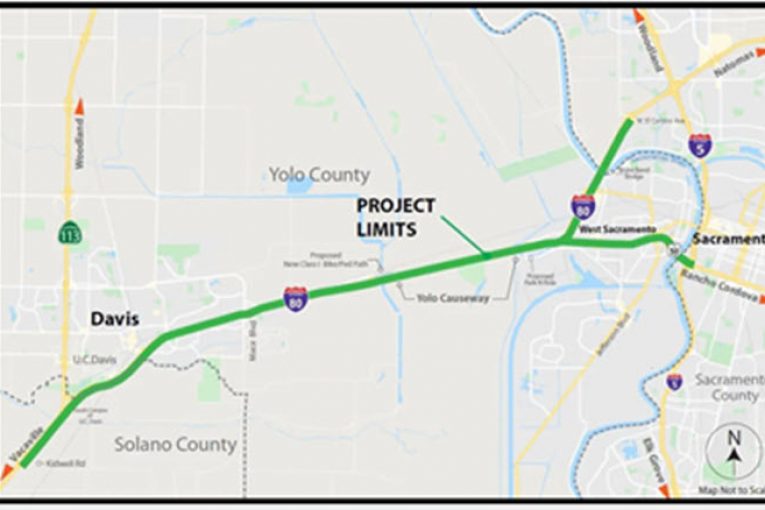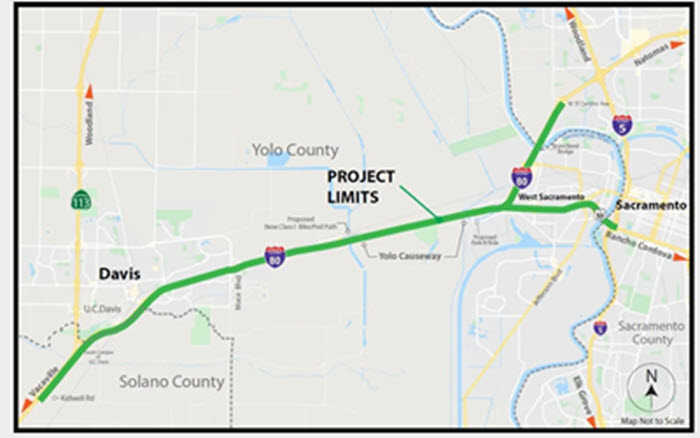

CTC’s $105M highway widening grant shows it has lost the plot when it comes to following Governor Newsom’s and the Legislature’s stated climate directives.
By Carter Rubin, NRDC and Alan Hirsch
On May 16 the California Transportation Commission (CTC) approved $105 million from the State’s Trade Corridor Enhancement Program (TCEP) to widen a stretch of Interstate 80 from Davis to Sacramento. In the room and on the Zoom feed, dozens of Davis and Sacramento-area and statewide advocates called in to ask CTC to reject the funding and push Caltrans to provide real congestion relief and reduced environmental impacts.
NRDC (Natural Resources Defense Council) identified TCEP in a 2023 report, “Closing the Climate Investment Gap,” as the state program that most heavily invests in highway widening in contravention of our state’s climate goals.
A study commissioned by the California State Transportation Agency came to a similar conclusion.
By NRDC’s latest estimate, CTC has granted over $2 billion total to more than 50 highway expansion projects since the TCEP program was created in 2018—even though the program is able to fund projects that are wins for both goods movement and the environment, like truck and train electrification projects and rail grade separation projects.
We’re at a pivotal time when the state’s climate laws require the state to dramatically scale up rail lines, bus routes, and active transportation corridors, while investing in electrification efforts that zero-out tailpipe pollution. Yet, the TCEP highway widening projects are doing just the opposite—collectively adding hundreds of millions of additional vehicle miles traveled (VMT) across the state per year. This is a trend we can and must reverse, as our friends at NextGen Policy detailed in their report, California at a Crossroads.
The Yolo I-80 project is indicative of the systemic issues at Caltrans and CTC and retro-thinking by Yolo County and city elected officials that reject their own climate action plans drawn up by 5 local citizen climateers to enable Caltrans.
What makes the Yolo I-80 highway widening particularly striking?
In NRDC’s January 2024 comment letter on the project’s Draft Environmental Impact Report (DEIR), we identified several fatal flaws with the analysis that require Caltrans to start the process over. NRDC was joined in submitting DEIR comments by the local Sierra Club Yolano Group, the Center for Biological Diversity, 30 environmental and transportation advocacy organizations from across the state, researchers from UCDavis and the California Air Resources Board.
To recap NRDC’s concerns:
- Caltrans improperly chopped this project into two pieces to use funding in illegitimate ways and obscured environmental impacts, as documented by a Caltrans whistleblower. The first project, already underway, is using maintenance-only transportation dollars to strengthen the shoulders of the highway so they can accommodate heavy vehicle travel. The second, which is the subject of the current environmental review process and TCEP application, would restripe the road to accommodate the additional lane of traffic in each direction.
- Caltrans used inappropriate and flawed models to evaluate alternatives it studied, which led it to significantly overstate the congestion benefits of the alternatives that add new vehicle lanes.
- Caltrans did not fully disclose and adequately analyze the Project’s impacts, because the DEIR relied on flawed modeling that led to erroneous conclusions about VMT, traffic impacts, greenhouse gas emissions, air quality, and energy impacts.
- Finally, the DEIR fails to adequately mitigate all the additional driving that the project will cause, even though there are feasible mitigation measures. Specifically, the project would mitigate only half the VMT it would cause, by Caltrans’s own count,and an even smaller percentage when correcting for Caltrans’s modeling flaws.
Other commentors have also noted the inherent environmental justice issue of adding a toll lane that both favors the rich,gives groups going to Tahoe toll free passage, and leaves unfunded social justice program to mitigate this inequity..
A Recurring Question at CTC: More Trucks or Not?
A particular recurring issue is whether the Trade Corridor Enhancement Program is living up to its name or not.
As the Los Angeles Times reported in January, then-CTC Commissioner Joe Lyou raised alarms that a TCEP-funded I-15 widening was claiming to air quality regulators that there would be no additional truck traffic, while claiming to CTC that the project would benefit goods movement by increasing truck traffic.
Similar issues are arising with Yolo 80. The California Air Resources Board pointed out to CTC in a March 2024 letter that the environmental analysis for the project used two different methods to calculate truck trips, and in each instance, the chosen method served to minimize the perception of environmental impacts from trucks.
Caltrans then purported to a key regional air quality advisory committee in April that the project would not significantly increase truck traffic and attendant lung-damaging pollution. Caltrans’s goal was to avoid the highway widening being flagged as a “Project of Air Quality Concern” under the Clean Air Act, which brings additional scrutiny and obligations. At the same time, Caltrans touted to the CTC in its TCEP application materials that “the project increases freight throughput by more than 800 trucks on a daily basis.”
Caltrans needs to pick a lane. Either the project doesn’t increase truck traffic significantly and is therefore not a compelling project for trade corridor funding. Or, it does cause truck traffic and Caltrans needs to be forthright with air quality regulators and mitigate the impacts.
A Bad Project Finds a Way
From its inception, this project has had dubious justification, and showed that Caltrans has systemic issues with adherence to the state’s climate and air quality goals.
Transportation Researcher Dr. Amy Lee’s case study on the I-80 widening showed that Caltrans District 3 went around Caltrans Headquarters to seek help from the Yolo County Transportation District (YoloTD) in securing a federal INFRA grant, after headquarters had continued to prioritize other state projects in its federal funding requests.
Then, when Caltrans nominated 24 projects for TCEP funding in a previous grant cycle, Caltrans ranked the Yolo 80 widening 24th out of 24. The Yolo 80 project was not funded by CTC in the prior TCEP cycle, and it is concerning that CTC made a nine-figure funding commitment to a project outside the normal approval cycle when that project didn’t have to compete against other projects. Caltrans has yet to respond to public records request explaining the change from rating it last for funding in 2023 and accelerated funding at this meeting.
CTC’s Credibility Is at Stake
Plucking a flawed project from the bottom of the pile to award a $105 million grant indicates that the CTC is not faithfully grappling with its role in building the clean transportation system that Californians deserve – one that cleans our air while giving commuters options for getting out of congestion, not just one more lane full of cars.
This project from the start could have been conceived in a totally different way. Imagine if instead of investing hundreds of millions of dollars in asphalt, Caltrans worked with partner agencies to focus on upgrading the Amtrak Capitol Corridor to provide fast, frequent, all-day service under 100% clean electrical wires. After all, it’s the 4th busiest Amtrak corridor in the county. And if the S.F. Peninsula, San Joaquin Valley and Southern Californiaare all getting fast electric rail, why is Sacramento being left out? In fact Caltrans full Comprehensive Sac to Bay Area I-80 Study (CMCP) rated upgrading Capitol Corridor rail to 30 minute 115mlh service 15 times more cost effective than road widening options.
The Federal INFRA grant secured for this project can pay for upgrades to freight rail lines, like double-tracking and grade crossing improvements, as an eligible grant activity. So can the Trade Corridor Enhancement Program. Improvements to freight rail would also benefit Capitol Corridor passenger service that shares those tracks.
Residents and decision-makers deserve a chance to consider real alternatives to congestion.
The CTC missed an opportunity to tell Caltrans: Be honest about the project’s impacts. Go back to the drawing board. Stop warming over 1950s solutions to our 21st century mobility needs.
